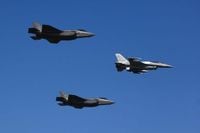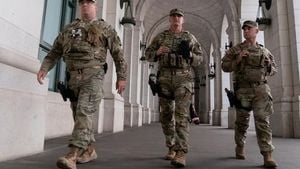Romania found itself at the epicenter of rising tensions in Eastern Europe on September 13, 2025, when two of its F-16 fighter jets were scrambled to intercept a Russian drone that breached its airspace near the Ukrainian border. The incident, which unfolded close to the village of Chilia Veche in the Danube Delta region, has stoked fresh concerns about NATO’s eastern defenses and the potential for the ongoing conflict in Ukraine to spill over into alliance territory.
According to Romania’s Ministry of National Defence, radar systems detected the unidentified drone late Saturday night. The F-16s, joined by two Eurofighter jets from German air policing missions, were dispatched with urgency. The jets tracked the drone until it “dropped off the radar 20 kilometers southwest of Chilia Veche,” the ministry reported. Authorities quickly issued warnings to residents in Tulcea County, advising them to take cover as a precaution. Helicopters were later sent to survey the area for possible debris, but preliminary assessments indicated the drone had exited Romanian airspace and returned to Ukraine. Defense Minister Ionut Mosteanu reassured the public, stating, “The population was never in danger.”
This was not the first time Romania has found itself in the crosshairs of the Ukraine conflict. As a NATO and European Union member sharing a 650-kilometer (400-mile) border with Ukraine, Romania has repeatedly reported Russian drone fragments landing on its territory since the start of the full-scale invasion. However, this latest breach is seen as a significant escalation, not just in frequency but in the boldness of such incursions.
The incident in Romania was mirrored by heightened military activity in neighboring Poland. On the same day, Polish authorities deployed aircraft and temporarily closed Lublin Airport in eastern Poland, responding to renewed threats of drone strikes as Russian aerial attacks on Ukraine intensified. Just days earlier, Poland had shot down several Russian drones in its airspace, marking the first time a NATO member engaged Moscow’s military assets over its own territory since the invasion began in 2022. The Polish Air Navigation Agency confirmed that flights at Lublin Airport were suspended as a precaution, with the Operational Command of the Polish Armed Forces emphasizing the preventative nature of the measures. “These actions are preventative in nature and aimed at securing airspace and protecting citizens, especially in areas adjacent to the threatened area,” the agency stated, according to Kyiv Independent.
Ukrainian President Volodymyr Zelenskyy did not mince words in his response. He asserted that “Russian military personnel know exactly where their drones are headed and how long they can stay in the air.” He continued, “The routes are always calculated. This cannot be an accident, a mistake, or the initiative of some lower-level commanders. It is a deliberate expansion of the war by Russia. This is how they operate — small steps at first, and in the end, great losses.” Zelenskyy called for tougher sanctions and collective defense measures among NATO allies, describing the breach as “an obvious expansion of the war.”
Romanian Foreign Minister Toiu Oana echoed these concerns, calling Russia’s actions “unacceptable and reckless.” She pledged to raise the incident at the United Nations General Assembly and pressed for swift adoption of the European Union’s 19th package of sanctions against Russia. Oana also called on NATO to implement the full spectrum of measures under the “Eastern Sentry” mission, which was launched on September 13 in direct response to the violation of Polish airspace by Russian drones. “Romania condemns Russia’s behavior and takes the necessary measures to protect its sovereignty and security,” Oana wrote on X.
International condemnation was swift and broad. Swedish Foreign Minister Maria Malmer Stenergard described the airspace breach as “another unacceptable violation of NATO airspace,” adding, “Sweden stands in full solidarity with Romania as a NATO ally and EU member state. We are always ready to contribute further to the deterrence and defense of the Alliance.”
NATO, for its part, has moved quickly to bolster defenses along its eastern flank. Secretary General Mark Rutte announced the “Eastern Sentry” initiative, which will bring additional F-16s, Rafale and Eurofighter jets, advanced radar systems, and expanded intelligence-sharing mechanisms to the region. “Eastern Sentry will add flexibility and strength to our posture and make clear that we are always ready to defend,” Rutte said, as reported by multiple outlets including BBC and Kyiv Independent.
Romania’s lawmakers, anticipating the rising threat, had earlier passed legislation allowing the military to shoot down unauthorized drones breaching national airspace during peacetime. However, as of the incident, enforcement rules for this law had not yet been finalized. Defense Minister Mosteanu revealed that Romanian pilots came close to taking down the drone as it flew very low before leaving national airspace, suggesting that the country’s rules of engagement are evolving as the threat landscape changes.
Polish Prime Minister Donald Tusk dismissed the idea that the drone incursions could be accidental, labeling them as provocations. “We would also wish that the drone attack on Poland was a mistake. But it wasn’t. And we know it,” Tusk said, reflecting the growing frustration among NATO members over Russia’s tactics. Meanwhile, U.S. Secretary of State Marco Rubio warned that if evidence showed the drones were intentionally aimed at NATO territory, “it would represent a highly escalatory move.”
Adding to the diplomatic complexity, U.S. President Donald Trump stated his readiness to impose major sanctions on Russia but conditioned such action on unanimous agreement among NATO members and a halt to Russian oil purchases by alliance countries. “I am ready to do major sanctions on Russia when all NATO nations have agreed and when all NATO nations stop buying oil from Russia,” Trump said. His remarks have drawn scrutiny from some allies who are seeking a more urgent response.
With NATO’s eastern members now on heightened alert, the alliance faces a delicate balance between deterrence and escalation. The incursions into Romanian and Polish airspace are seen by many as part of a broader Russian strategy to test NATO’s resolve and unity. As the situation continues to evolve, Romania’s location on the alliance’s frontier and its repeated exposure to drone threats make it a focal point in the ongoing standoff between Russia and the West.
For now, the message from Bucharest, Warsaw, and Brussels is clear: these are not isolated incidents, and the stakes for miscalculation could be enormous. As defensive measures are strengthened and diplomatic warnings multiply, the region watches anxiously to see how far Russia is willing to push, and how firmly NATO will respond.




